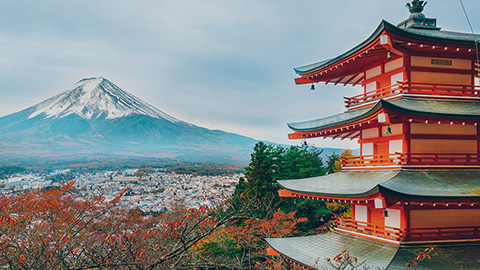May 2023
Japan's New Wave of Collaborative Innovation
March 2024

Innovation ecosystems centered on universities and research institutions are growing up in various regions of Japan. This reflects a paradigm shift that emphasizes curiosity and individual competence and is becoming increasingly pervasive as Japan's innovation culture diversifies and expands beyond urban hubs.
Innovation Ecosystem in the Countryside
One of Japan's most remarkable startup incubators sits nestled amid rice fields some 300 kilometers north of Tokyo.
Tsuruoka Science Park, in Tsuruoka City, Yamagata Prefecture, was founded in 2001 by Keio University in collaboration with several local governments including Tsuruoka City. What began as a bare-bones research center—housed in a single two-story building and staffed by a dozen people—has grown into a sprawling biotech hub, complete with a hotel designed by world-renowned architect Shigeru Ban.
Companies that have got their start in Tsuruoka include Spiber, a manufacturer of fermented proteins whose ambition to revolutionize the clothing industry has earned it "unicorn" status—an investor valuation of at least a billion dollars.
"Our researchers want to use technology to change the world," says Masaru Tomita, a professor of biology and information technology at Keio University, who serves at the Science Park's director. A company co-founded by Tomita, Human Metabolome Technologies (HMT), which specializes in analyzing biological samples, listed its shares on the Tokyo Stock Exchange's Mothers emerging-companies section in 2013.
Japan was often seen as a tough place for startups spinning out from universities. In general, university-launched startups engaged in advanced technological development require a considerable amount of time and funds before they can flourish. This is why, big, established companies lead the tech landscape and independent ventures and startups struggled to attract funding. In addition, research at universities have been traditionally siloed and focused on basic research as their main purview, while commercial R&D is mainly handled by major corporations. It's a division of labor that leaves little room for maverick inventors with paradigm-shifting ideas.
But things are changing.
A new generation of innovators, inspired by examples like Tsuruoka Science Park, is breaking down barriers between academia and business and creating new paths to success—both scientific and commercial. The Government is supporting the trend with new policies and funding.
"A business is a tool for taking an idea out of the lab and into society," says Tomita, who encourages students and researchers in Tsuruoka to pursue ideas without regard for their commercial applications, at least in the initial stages.
"A lot of Japanese organizations are full of honors-student types—people who are good at taking tests and memorizing accepted answers," he says. "But you need an environment where curiosity and individual ability can flourish. Without curiosity, you're dead."
Unicorn Born through Curiosity
Spiber, the protein producer, exemplifies this philosophy.
Co-founder Kazuhide Sekiyama was fascinated by spider webs when he was a student at Keio's Tsuruoka Town Campus, which is formally known as the Institute for Advanced Biosciences, Keio University. Spiders use natural proteins to make their webs, and Sekiyama hoped to mimic the process to make new kinds of fibers—textiles that would be man-made yet completely natural.
Other researchers, including scientists at NASA, had had similar ideas in the past, but had failed to turn them into viable materials. Sekiyama didn't let this daunting history deter him, and today Spiber is collaborating with global brands including The North Face to produce high-quality, ecological clothing using its proprietary "brewed protein" fibers.
Since raising 34.4 billion yen (approximately 233 million USD) from Japanese and foreign investors in 2021, Spiber has continued to raise funds, including through a third-party allocation of new shares from a Japanese trading company, and as of January 2024, the company is valued at roughly 166 billion yen (approximately 1.12 billion USD).

Biolab, The Institute for Advanced Biosciences at Keio University in Tsuruoka Science Park
Government Push Accelerates Innovation
It is not unique to particular universities like Keio University that has spawned an "innovation ecosystem" in recent years.
The number of joint research projects between universities and the private sector increased to more than 30,000 in FY2022. On the capital side, the acceptance of research funds from the private sector by research institutions has expanded to approximately 138 billion yen (approximately 933 million USD).
In an effort to improve the system, the government established "Guidelines for Enhancing Industry-Academia–Government Collaboration Activities" in 2016, with the goal of tripling investment from private companies to universities and other institutions over the next 10 years.
In response, many universities have strengthened industry–academia collaboration. For example, Osaka University has concluded a comprehensive collaboration agreement with Chugai Pharmaceutical, a longtime supporter of the university's Immunology Frontier Research Center (IFReC), for support totaling 10 billion yen (approximately 67.6 million USD) over 10 years. Chugai will receive information disclosures on the results of IFReC's research, and also acquire the right of first refusal regarding joint research.

Masaru Tomita, a director of Tsuruoka Science Park
Hiroshima University also signed a comprehensive research cooperation agreement with Kobelco Construction Machinery, whereby Kobelco established a research institute and demonstration test site on campus, and receives matching researchers from the university, thus expanding the potential for joint research.
In addition, even if there are excellent technology seeds in universities and research institutes, they often fail to spin out because they do not have management personnel and knowledge. To address this issue, the Ministry of Economy, Trade and Industry (METI) has launched a project from FY2023 to promote the activation of the university-launched startups ecosystem by developing and fostering management personnel with business experience and supporting the matching of university technology seeds and university-launched startups with these management personnel.
Japan's Innovation Ecosystem Welcomes Diverse Talent
In terms of university-launched startups, other institutions are also nurturing startup businesses, in fields ranging from information technology to chemistry to medicine. The number of startups originating in Japanese universities more than doubled between FY2016 and FY2022, to 3,782, according to METI.
As of 2022, the largest number of startups are located in Tokyo, but thanks to Japan's nationwide network of high-quality universities, regional cities and towns are being seeded with innovative new businesses, too. Hokkaido Prefecture hosts 94 university-launched startups; Fukuoka Prefecture is home to 162.
The government is supporting the trends with policies such as Startup City Project Japan, under which eight Startup Cities are being provided with intensive support for ecosystem building in cooperation with local governments, universities, and the private sector. In 2021, the government established a 10 trillion yen (approximately 67.6 billion USD) Japan University Fund in the Japan Science and Technology Agency. The government apply gains resulting from the investment of the fund to long-term and stable financial resources to provide the necessary support for innovative research.
The most ambitious of the new university-spawned startups takes a global perspective from their inception. About 10 per cent of Spiber's workforce of roughly 300 people is non-Japanese, a share that is growing as the company makes inroads with global apparel brands.
“We are in deep Japan here, and I think that's attractive to a lot of people from overseas,” says Tomita about Tsuruoka Science Park's rural location. “But it's also a very open and free environment. It's welcoming to all sorts of people.”
-
*
1 USD = 147.88 yen (as of March 8, 2024)
Learn More
Contact Us
Investing in and collaborating with Japan
We will do our very best to support your business expansion into and within Japan as well as business collaboration with Japanese companies. Please feel free to contact us via the form below for any inquiries.
Inquiry FormJETRO Worldwide
Our network covers over 50 countries worldwide. You can contact us at one of our local offices near you for consultation.
Worldwide Offices

































